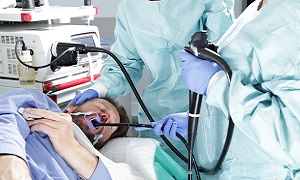Esophagitis
Esophagitis is a condition that causes inflammation or irritation in the esophagus. The tube that sends food from your mouth to your stomach is called the esophagus. Common causes of this condition include acid reflux, bacterial or viral infections, or side effects of medications.
If left untreated, esophagitis might lead to ulcers, scarring as well as severe narrowing of the esophagus, which may be a medical emergency.
Symptoms
Some of the signs and symptoms of esophagitis are:
- Difficulty in swallowing
- Painful swallowing
- Heartburn
- Acid regurgitation
- Chest pain, mainly behind the breastbone, that occurs while eating
- Swallowed food getting stuck in the esophagus
This condition is also common among infants and young children, particularly those who are too young to explain their discomfort or pain. They might show symptoms such as:
- Feeding difficulties
- Failure to thrive
It is noteworthy that most of the signs and symptoms can also be caused by various different conditions that affect the digestive system. You should consider seeing your doctor if the symptoms:
- Lasts more than a few days
- Are severe enough to make it harder for you to consume food
- Don’t improve or go away after you use over-the-counter antacids
- Are accompanied by signs and symptoms of the flu, such as headache and fever
You should also consider seeking emergency care if you:
- Experience heavy pain in the chest that lasts over a few minutes
- Have a history of heart disease and also experience pain in your chest
- Suspect that you may have food lodged in your esophagus
- Experience pain in the mouth or throat while consuming food
- Experience shortness of breath or chest pain, usually after eating
- Vomit large amounts or have forceful vomiting
- Have trouble breathing after you vomit
- Are having vomit that is yellow or green or contains blood
Causes & risk factors
Certain factors that make you more likely to develop esophagitis include:
- The weakened immune system caused by HIV or AIDS, leukemia, diabetes, or lymphoma
- Hiatal hernia
- Surgery in the chest area
- Chemotherapy
- Radiation therapy of the chest
- Chronic vomiting
- Obesity
- Alcohol and cigarette use
- Medications are taken to prevent organ transplant rejection
- Immunosuppressive medications used in the treatment of autoimmune diseases
- Aspirin and anti-inflammatory medications
- A family history of allergies or esophagitis
If your immune system is healthy, your chances of developing an infection in the esophagus are quite low.
Diagnosis
In order to confirm your diagnosis, your doctor will need a physical exam, as well as one or more tests. These tests can include:
Barium X-ray
For this test, you are supposed to drink a solution that contains a compound known as barium or take a pill that is coated with barium. Barium coats the lining of the esophagus and stomach, and thus, the organs become visible. Then your doctor is able to take images, which can help identify narrowing of the esophagus, as well as other structural changes, a hiatal hernia, tumors as well as other abnormalities that can be leading to the symptoms.
Endoscopy
In this method, your doctor guides a long, thin, and equipped with a tiny camera, i.e. endoscope down the throat and into the esophagus. With the help of this instrument, your doctor is able to look for any unusual appearance of the esophagus and remove small tissue samples for testing. Depending on the cause of the inflammation, the esophagus might look different, such as drug-induced or reflux esophagitis. You are going to be sedated lightly during this test.
Biopsy
Treatment
Medications
Treatments for this condition generally depend on the cause:
- Esophagitis that is caused by an infection can be treated with medications to cure the infection.
- Esophagitis caused by a medical procedure might require the use of acid-blocking medications for a long time
- Esophagitis which are caused by acid reflux or GERD is treated with medications for reducing or blocking acid production
- If your esophagitis is caused by medications, you might need changes in your medication. However, it is quite important to talk to your doctor before you stop or change your medications.
If the condition is diagnosed early enough, then medications and dietary changes are enough to allow healing of the body. However, if the damage is severe, or leads to scar tissue, which makes swallowing difficult, then it might make more invasive treatments necessary.
Endoscopy
Endoscopy is able to remove any lodged pill fragments, food, or foreign bodies stuck in the esophagus. Stretching or dilatation of the esophagus might also be done as part of this procedure.
Surgery
Surgery might become necessary in order to remove any damaged portions of your esophagus. In the case of Barrett’s esophagus, where the risk of cancer increases, surgery is generally the preferred treatment.
Complications
If left untreated, esophagitis might lead to various health complications related to the function and structure of the esophagus. Some of these complications can include:
- Barrett’s esophagus, where there is damage to the lining of your esophagus. This may even lead to a precancerous change in the tissue.
- Stricture, or narrowing, of the esophagus that might cause obstruction and problems swallowing
Holes or ulcers in the esophagus, i.e. esophageal perforation.




